We don’t know much about computer hacking here at Cracked, because that stuff involves numbers, but we’ve come across a whole bunch of different crazy brain and body hacks over the years. The following pages will help you change reality for yourself and others, stop pain by coughing, and even make yourself more attractive to the opposite sex. Years of gathered wisdom are at your disposal. Read on:
If You Avoid Thinking About the Future, You Get Better at Everything

Consider the tenses past, present, and future. The difference between the sentences “Bob is at the store buying nachos” and “Bob will go to the store to buy nachos” has explicit implications about how far we are from eating nachos. That is need-to-know information. But it may be surprising that some languages don’t have a future tense, or it’s not obligatory. In Mandarin, for example, it’s fine to say something like “Bob store buy nachos,” and nobody will make fun of your caveman speech or slap you in the mouth because you didn’t immediately specify the time frame of nacho delivery.

In Mandarin, they always keep spare nachos.
One might think that speakers of such languages would just be wandering around confused, utterly unmoored from time as we know it, hurtling obliviously through chronology with no anchors to tether them, screaming into the void as history whips pas-
No? They’re totally fine?
Huh. It turns out that speakers of these tenseless languages actually make far better decisions than tense-language speakers, about virtually everything.

Because they’re less tense.
For example, a study by Keith Chen of Yale Business School analyzed data from 76 countries, focusing on things like saving money, smoking and exercise habits, and general health. The surprising result was that cultures in which most people speak languages without a future tense make better health and financial decisions overall. In fact, it found that speaking a tensed language, like English, made people 30 percent less likely to save money. It is thought that speakers of such languages, whom we shall call Untensers, see their lives as less of a timeline and more of a whole. Therefore they are automatically more mindful of how their decisions will affect their futures than we savage, primitive Tensers. Strangely, it seems that thinking of “the future” as being some far-off place, removed from the realities of our daily lives, makes us more likely to buy that second Xbox just because the first looked lonely.
Untensers consistently accumulate more wealth, hold onto it for longer periods of time, are healthier, and live longer than Tensers, for whom the past is something we’ve left behind, and the future is like a distant planet where consequences live that we don’t fully intend to visit.
Music Changes Your Ability to Perceive Time

Hold music — the stuff you hear on the line when you call everyone from the bank to your local bail bond agency — didn’t fall into America’s phone lines by accident. It’s designed specifically to reduce the amount of time you think you’re waiting, so that you’re less likely to hang up in anger. Other places that involve waiting, such as doctors’ offices, use a similar trick. Time shrinkage is also the aim of most retail stores, which is why you’ll rarely enter a mall, supermarket or clothing store without hearing some sort of music in the background.

Our coke dealer always has Iggy Pop on at his apartment.
How Does It Work?
To understand why exactly music makes it seem like less time has passed, think of the human brain as a mountain lion that is eating a bag of money. It doesn’t matter what the zookeepers distract it with — food, shiny objects or just shouting and yelling. All that matters is that they give another zookeeper the chance to sneak up and retrieve the money while the lion is busy deciding which one of them to eat.
Similarly, when your brain is steadily distracted, you’ll be less likely to notice things around you in detail, and this includes the passage of time. Our brains have limited input capacity, and when something else is using up that capacity, we’re less likely to think things like, “I’ve been standing in line to get Richard Moll’s autograph for three goddamn hours” or “Do I really need this Garfield alarm clock?”

“Will Katy Perry really sleep with me if I keep buying her music?”
But it works the opposite way, too. In some situations, listening to music can actually expandperceived time. For example, listening to music while performing tasks that require concentration will usually cause us to overestimate the amount of time that has passed. The theory is that as your mind switches back and forth between perception of the music and concentration on the challenging tasks, it forms separate “events,” or distinct memories. When your brain thinks about what you’ve been doing for the past hour, you’ll remember more of these events and recall that the hour was quite long.
Experiments have found that time also expands when we’re listening to familiar music that we dislike.
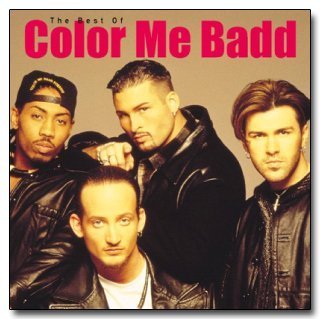
When we hear the opening chords of a song, our brain remembers the whole thing and immediately skips ahead and plays it mentally. This fake mind-music is extremely vivid, working on exactly the same parts of the brain as actual music does. So the effect is that you take a few moments to vividly imagine that you’re sitting through five minutes of that damn New Radicals song before you come back to reality only to realize that you still actually have to sit through it.
Change the Reality of a Situation by Changing How It’s Phrased

You’re probably already aware that minor changes to the wording of a survey can alter people’s opinions. During the health care debate in 2010, for example, four separate organizations conducted polls to see what percentage of Americans supported a so-called “public option.” Their results ranged from a measly 44 percent to 66 percent support, due in large part to differences in wording. Calling it a “government administered health insurance plan — something like the Medicare coverage that people 65 and older get” garnered 66 percent support. And calling it “a government-run health insurance plan” plummeted support to 44 percent. Calling it “Just what Mussolini would have wanted” reduced the number to 2 percent.

“Ha-HAAAAAAAH! NOW I’VE GOT YOU!”
You might think that it’s just a matter of people not actually understanding how the system works (“I said I wanted Medicare, not GOVERNMENT!”), but it really is all about how the brain can be manipulated with very subtle differences in wording, regardless of your knowledge level.
What? How?
In this study, social psychologists sent out surveys to several hundred registered voters before an election. Half the recipients were asked if it was “important to vote.” The other half were asked if it was “important to be a voter.” With this one difference, the people who read the word “voter” were nearly 14 percent more likely to actually vote on Election Day. The researchers suspected that using the word “voter” caused people to identify themselves with the word. Since these people considered themselves to be voters, they were more likely to get out and vote.

“I was called a motherfucker, too, but that’s on everyone’s manifesto.”
On the other hand, using the word “vote” implied that the survey was asking the people to perform a task. Even if they answered “yes” to the question, they felt no association with the word (i.e., they weren’t voters, they were just being told to vote), so they were less likely to follow through. One was about a simple action, the other was about being a type of person.
You’ve been manipulated this way all your life, and now it’s time to start manipulating back. Don’t ask your friend with the truck if he can help move your mattress; ask if he’ll participate in a community-supported housing initiative. Don’t ask the cop to let you off for speeding; ask if Officer Gives-a-Shit doesn’t want to stimulate the local economy via a highly targeted middle-class tax break. Getting your way is easy when you let your words do the weaseling for you.
Music Makes You Stronger

It’s no secret that many people prefer to listen to music when they work out. But music doesn’t just make physical activity more pleasant — it actually makes our physical performance measurably better. When listening to music, people are able to hold heavy weights for longer than when they’re standing in silence. They can also complete sprints in smaller amounts of time and are even able to reduce their oxygen intake.

This is why Rocky does all of his training in musical montages.
How Does It Work?
Similar to the time-perception effect we referenced above, one element is just plain old distraction. Obviously, if your mind is listening to music, it’s not thinking about how much your legs hurt or how much longer you’ve got to run before the treadmill makes that final beeping noise. But there’s much more to it than that.
First, there’s synchronicity. When you match your movements to a steady musical tempo, you spend less time and effort on the inefficient slowing down and speeding up that happens when you’re going by your own rhythm. Music also increases the incidence of “flow” states — states of meditation-like calm in which everything works right for an athlete and that is strongly linked to enhanced performance.

It’s all in the music.
Music can even make you feel less pain. Patients listening to music after surgery need less sedatives, report less pain and have lower blood pressure. As if that’s not impressive enough, doctors have found that specially selected melodic music dramatically reduces stress in patients during unsedated brain surgery. In some cases, music caused patients to relax so much that many of them fell into a deep sleep, while people sliced into their exposed brains with fucking scalpels.
And even if you’re lucky enough to be asleep during surgery, there’s a good chance the doctors working on you are listening to music, since most surgeons believe it improves their performance, too. So the next time you’re about to go under a general anesthetic, consider the fact that the guy with the scalpel might soon be timing his incisions to Whitesnake.

“Here I go again on my own, sawing through the whitest bones I’ve ever knooown …”
Your Hand Is a Poor Man’s Night-Vision Goggles
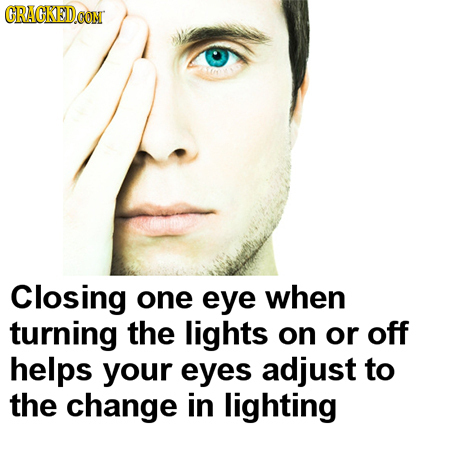
Thinking You Smell Good Makes You More Attractive

Entire multibillion-dollar industries are built upon the idea that smelling good gets you dates (smell can also influence who you’re attracted to). But when we say that your sense of smell can make a man more attractive to the ladies, we’re not just pointing out that a quick sniff test of one’s clothing before heading out is a reliable start on the path of not dying alone. And we’re not talking about those pheromone sprays that promise to make women ignore the crumbs caught in your neckbeard.
No, this is weirder.

Because horse souls smell like fucking.
In a recent study conducted by the University of Liverpool, they had some guys spray themselves with Lynx (the English version of Axe Body Spray). Then they had women rate the men’s attractiveness … via videotape. As in, they were out of smelling range. The men who sprayed themselves down were still rated as more attractive, even though the women couldn’t smell them.
But How?
According to the scientists running the experiment, the power was inside the men the whole time. The guys given the scented spray figured they smelled good, so their body language displayed more confidence, and the women who watched them responded to that.

“You don’t have to tell me. Johnny Beardface already knows, baby.”
So does this mean these dudes were just brainwashed by Lynx’s marketing campaign? They actually believed the ads that claim spraying this stuff will have women diving for their junk?
Nope — the can of spray used in the experiment was unmarked, so the men had no idea what kind of deodorant they were covering themselves with. It seems like pretty much anything that doesn’t actually smell like mustard gas will do the trick. It turns out the amazing mind-control powers of smell aren’t about making the girl at the bar swoon — it’s about tricking yourself into having a little confidence for once.

“I … I’m just shy. I can’t help it.”
Filling Your Cubicle With Personal Crap Makes You Productive

Nobody else likes the personal crap you fill your desk with at work. That “inspirational” picture of you and your mom climbing Mount McKinley is trite and forgettable. Oh, and that picture of your girlfriend with the lyrics to “Wonderwall” printed beneath it? Do you even know what that song’s about? Clearly not, because no one does.
And yet, somehow, this asinine behavior hacks your brain.
How? Tell Me!
Having control over one small, utterly inconsequential aspect of our lives improves our productivity by 32 percent. Learning this is a real shot to the nuts for your adolescent sense of rebellion. Faceless corporations (man) can cram us into our upholstered prisons like sardines in a can, but we’ll still do their bidding as long as they give us a crayon to color the wall with. The unvarnished truth is that our supposedly indomitable spirits (man) can be domitabled with as little as a roll of double-sided tape, some glitter, a color printer, and five minutes’ access to our Facebook photo albums.
Truly, the spirit of the revolution is dead. Maaan.
You Can Feel Like You Had a Good Night’s Sleep After Two Hours

So you just picked up the night shift at your local McDonald’s, you have class every morning at 8 a.m., and you have no idea how you’re going to make it through the day without looking like a guy straight out of Dawn of the Dead, minus the blood … hopefully.

“SLEEEEEEEEEP … uh … I mean … BRAAAIIIIINNNSSS …”
What if we told you there was a way to sleep for little more than two hours a day and still feel more refreshed than taking a 12-hour siesta on a bed made entirely out of baby kitten fur? No more sneaking naps at the fry station for you!
How? Tell Me!
It’s called the Uberman Sleep Schedule, and besides having a totally badass name, it’s a way to get the maximum amount of essential sleep for your body without wasting hours of precious time you could be using to work or drink or farm for World of Warcraft gold. The schedule consists of taking six 20- to 30-minute power naps every four hours during the day. Of course, this new sleep pattern blows donkey-dick to get used to, but it’s a price you have to pay to basically extend your waking life by several years.
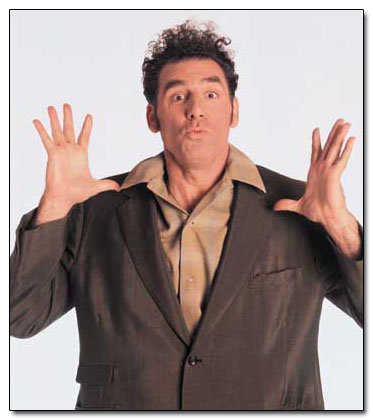
We’re pretty sure Kramer did this once on Seinfeld so it’s probably a great idea.
The best way to start it off is to jump right in. Get to sleep at 8 p.m., set your alarm for 8:30. Get up, play some Call of Duty, sleep again at 12, alarm at 12:30, and so on. After three or four days of this, you will start to get high as fuck because of sleep deprivation, and you might just want to kill yourself, but don’t do it! That would be absolutely counterproductive.
By day 10 or so, your brain will say, “Fuck! FINE, we’ll do it your way,” and will adapt to your new superhuman sleep schedule. When you sleep normally, your body gets only about an hour and a half of REM sleep, the kind of sleep that is thought to be the most important to keeping your brain sharp. While other stages of sleep help your body to heal and grow, the REM sleep is what makes you feel rested.

Of course, sleeping in a bed doesn’t hurt, either.
The first few days of adjusting are tough because your body isn’t getting ANY of this REM sleep, and your brain hates you for it. After the third day, or so, your brain figures out that you mean business, and every time you lie down for one of these naps, it dives directly into REM sleep in an attempt to compensate for the deprivation. Do some quick math and that’s two full hours of REM sleep, while those who sleep normally are only getting an hour and a half.
Before you know it, while the rest of the world snores away, you’ll be up and drawing dicks on their faces.

Sports Drinks Work (and You Don’t Even Need to Drink Them)

Sports drinks are a huge business — Gatorade alone makes well over a billion dollars a year. And the reason so many athletes swear by them is the promise of increased performance, replacing all those vital nutrients lost during exercise, just like the ads say.

“GIVE ME SIGHT BEYOND SIGHT!”
It turns out, however, that all that electrolyte and rehydration technology is nothing compared to the simple pleasure of having a bunch of sugar in your mouth.
Wait, What?
A study found that sports drinks work because they activate the pleasure center of your brain. You don’t even have to drink them, just swishing some around in your mouth and spitting it out has the same effect.

However, motor oil will not “unlock the power” like the bottle says.
The carbohydrates in the drink stimulate receptors in your mouth that then send your brain messages that things are all totally cool. Your brain, in turn, becomes more active in the pleasure center, allowing you to enjoy feeling the burn far longer than some idiot without a sugary drink. It also stimulates the part of your brain in charge of movement control. So not only will you be content while kicking your water-drinking opponent’s ass, you’ll actually be kicking it harder.

Trick Your Brain into Thrift by Paying With Cash
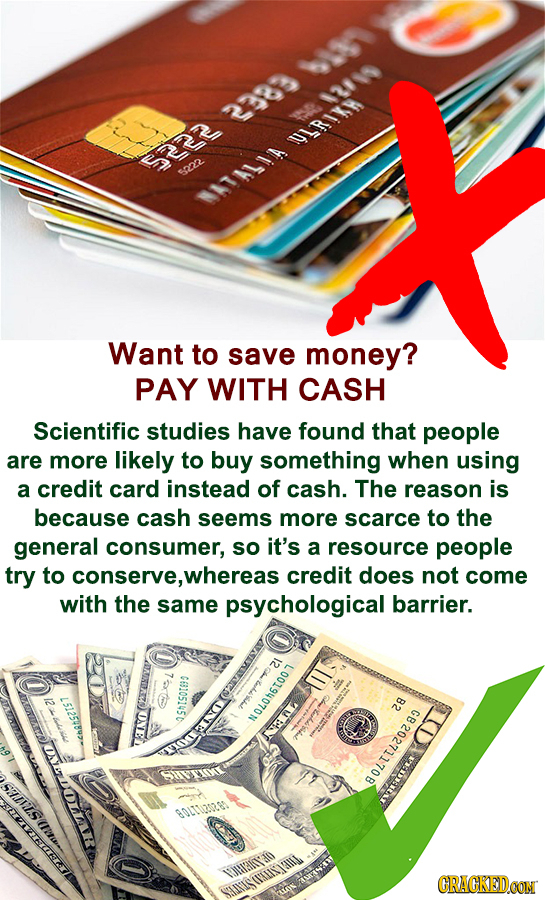
You Can Tell If She’s Interested by Looking at Her Feet

Remember back in high school when you were talking to that cute girl you really liked, but you couldn’t tell if she liked you back, and your fear of rejection prevented you from expressing your feelings in any way apart from night after night of tearful masturbation? Remember when you did the same thing last week? Wouldn’t asking someone out be so much easier if you knew how they’d answer before you asked them?
Science to the rescue!
How? Tell Me!
Experts will tell you it’s all in the body language, but you know better. People — and especially women — are really, really good at feigning disinterest. Anything short of the woman outright grabbing your junk will be lost on most guys.

“I realized she was into me right around the time we started having sex.”
But watch her feet.
Apparently, people aren’t as conscious of their foot movements as they are of other parts of their body, and so their feet can unconsciously send messages about themselves. They did a study at the University of Manchester on this, observinging subjects’ foot movements in various social situations.

The angle of her heels says “I put out,” but those knees say “not for you.”
Specifically, they found that if a woman moves her feet apart to adopt a more open-legged stance, it generally means that she’s into you. However, if she finds you utterly repulsive, she will likely cross her legs or keep them tucked underneath her body. We’ll, uh, let you figure out the symbolic meaning of those gestures.
Your Brain Can Be Tricked into Legal Hallucinations

Yes, that’s right, kids! Tell your dealer goodbye and worry no more about winding up naked on the roof of an office building after a bad trip. Now you can be stoned out of your mind by building a homemade deprivation chamber out of some regular, completely harmless household objects.
How? Tell Me!
You ‘ll need three things: a ping pong ball, a radio with headphones, and a red light.
Step 1: Turn the radio to a station with white noise (static) and put on your headphones.
Step 2: Cut the ping pong ball in half and tape each half over your eyes.
Step 3: Turn the red light so it’s facing your eyes.
Step 4: Sit there for at least a half hour.
Step 5: Follow Ben Franklin and your new friend, Harold the unicorn, into the gumdrop forest, and live happily ever after.
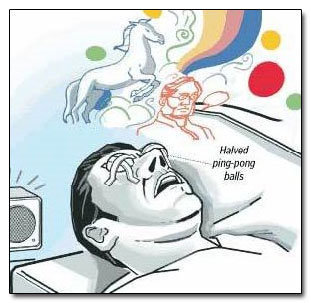
How Does It Work?
It’s called the Ganzfeld effect, and it works by blocking out most of the signals that go to your brain. It’s the same kind of effect you get when looking into a soft light for a while and lose vision, except on a larger scale.
The sound of the white noise and the light from the outside of the ping pong ball are eventually ignored by your brain. With all those signals out of the picture, your brain has to create its own, and this is where the hallucinations come in. We can’t guarantee they won’t involve, say, the ghost of Lizzie Borden trying to hack off your scrotum with an ax, but that’s the risk you take, dammit.

Now, if you want a little more control over your hallucinations …
#57. You Can Dream Whatever You Want to Dream

What if we told you there was a way to make all your fantasies come true? You could have that sports car you’ve always wanted and the daily threesome with Sarah Palin and Cannonball Run-era Burt Reynolds. Hell, we’ll even throw in a few superpowers for your enjoyment.

We never miss an opportunity to use this picture.
Welcome to the wonderful world of lucid dreaming.
How? Tell Me!
Most of you reading this have had a lucid dream before. Every once in a while you wind up in a dream but somehow recognize it as a dream, and you may have found yourself able to pretty much program the dream to your specifications. While there are plenty of tips and tricks to make this happen on purpose, we’ve narrowed it down to what seems like the most useful, so that you can be riding dinosaurs with Gary Coleman in your sleep in no time:

Cowboy hat optional.
1. Keep a Dream Journal
As soon as you wake up from a dream, write down every little thing you can remember about it. Supposedly by writing it down, your brain recognizes certain patterns that only occur in a dream (since most dreams are immediately forgotten) and if they are on paper, you can recall them easily.
2. Think about exactly what you want to dream right before you fall asleep. Makes sense. For instance you’ve probably fallen asleep watching MythBusters before and immediately dreamed you were flying through the air, using a giant version of Jamie’s mustache as a hang glider.

Just us?
3. The best time to have a lucid dream is either right before you regularly wake up, or right after. Studies have shown that more people have lucid dreams when they take a nap shortly after they first wake up in the morning.
So you can do all that, or if you are the lazy type, get yourself something like the NovaDreamer, a device that detects when you’ve entered REM sleep and then makes a noise that’s supposed to be not quite enough to wake you up, but enough to raise your awareness to, “Hey, this is totally a dream I’m having!” levels.
Obviously the big difference between a dream and real life is that if the Hamburglar came bursting out of your refrigerator right now and started screaming at you in Vietnamese, your first thought would be “This is a strange and unusual event that is occurring right now, and I should question my perceptions.” If the same thing happens in a dream, you just go with it.

Yes, Mel Gibson is dressed like Colonel Sanders. No, this is not a dream.
In a dream state, your mind mostly loses the ability to criticize anything that’s happening because dreaming just doesn’t involve the critical part of your brain. You’re all worried that you’re at work in your underwear, and don’t even blink at the fact that your boss is a dragon who speaks in the voice of your old middle school gym coach.
But if you change your mental state ever so slightly, that critical part of your brain can keep functioning even while in dreamland. If you can perfect the technique of dreaming while not all the way asleep, the next thing you know you’re ordering up a Smurf orgy.
Source:www.cracked.com







